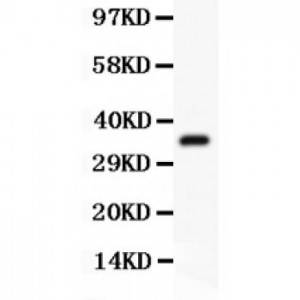More info
Overview
Long Name | Antibody Type | Antibody Isotype | Host | Species Reactivity | Validated Applications | Purification |
| ubiquitin B | Polyclonal | IgG | Rabbit | Human, Mouse, Rat | IHC-P, WB | Immunogen affinity purified. |
Immunogen | ||||||
| E.coli-derived human Ubiquitin recombinant protein (Position: M77-G152). | ||||||
Properties
Form | Lyophilized |
Size | 100 µg/vial |
Contents | Antibody is lyophilized with 5 mg BSA, 0.9 mg NaCl, 0.2 mg Na2HPO4, 0.05 mg NaN3. *carrier free antibody available upon request. |
Concentration | Reconstitute with 0.2 mL sterile dH2O (500 µg/ml final concentration). |
Storage | At -20 °C for 12 months, as supplied. Store reconstituted antibody at 2-8 °C for one month. For long-term storage, aliquot and store at -20 °C. Avoid repeated freezing and thawing. |
Additional Information Regarding the Antigen
Gene | UBB |
Protein | Polyubiquitin-B |
Uniprot ID | P0CG47 |
Function | Ubiquitin: Exists either covalently attached to another protein, or free (unanchored). When covalently bound, it is conjugated to target proteins via an isopeptide bond either as a monomer (monoubiquitin), a polymer linked via different Lys residues of the ubiquitin (polyubiquitin chains) or a linear polymer linked via the initiator Met of the ubiquitin (linear polyubiquitin chains). Polyubiquitin chains, when attached to a target protein, have different functions depending on the Lys residue of the ubiquitin that is linked: Lys-6-linked may be involved in DNA repair; Lys-11-linked is involved in ERAD (endoplasmic reticulum-associated degradation) and in cell-cycle regulation; Lys-29-linked is involved in lysosomal degradation; Lys-33-linked is involved in kinase modification; Lys-48-linked is involved in protein degradation via the proteasome; Lys-63-linked is involved in endocytosis, DNA-damage responses as well as in signaling processes leading to activation of the transcription factor NF-kappa-B. Linear polymer chains formed via attachment by the initiator Met lead to cell signaling. Ubiquitin is usually conjugated to Lys residues of target proteins, however, in rare cases, conjugation to Cys or Ser residues has been observed. When polyubiquitin is free (unanchored-polyubiquitin), it also has distinct roles, such as in activation of protein kinases, and in signaling. |
Tissue Specificity | |
Sub-cellular localization | Ubiquitin: Cytoplasm . Nucleus . |
Sequence Similarities | Belongs to the ubiquitin family. |
Aliases | FLJ25987 antibody|MGC8385 antibody|Polyubiquitin B antibody|RPS 27A antibody|RPS27A antibody|UBA 52 antibody|UBA 80 antibody|UBA52 antibody|UBA80 antibody|UBB antibody|UBB_HUMAN antibody|UBC antibody|UBCEP 1 antibody|UBCEP 2 antibody|UBCEP1 antibody|UBCEP2 antibody|Ubiquitin antibody|ubiquitin B antibody |
Application Details
| Application | Concentration* | Species | Validated Using** |
| Western blot | 0.1-0.5μg/ml | Human | AssaySolutio's ECL kit |
| Immunohistochemistry(Paraffin-embedded Section) | 0.5-1μg/ml | Human, Mouse, Rat | AssaySolutio's IHC/ICC Detection kit |
AssaySolution recommends Rabbit Chemiluminescent WB Detection Kit (AKIT001B) for Western blot, and Rabbit Peroxidase IHC/ICC Detection Kit (AKIT002B) for IHC(P). *Blocking peptide can be purchased at $65. Contact us for more information

Anti- Ubiquitin antibody, ASA-B1948, Western blotting
All lanes: Anti Ubiquitin (ASA-B1948) at 0.5ug/ml
WB: Recombinant Human Ubiquitin Protein 0.5ng
Predicted bind size: 36KD
Observed bind size: 36KD
All lanes: Anti Ubiquitin (ASA-B1948) at 0.5ug/ml
WB: Recombinant Human Ubiquitin Protein 0.5ng
Predicted bind size: 36KD
Observed bind size: 36KD

Anti- Ubiquitin antibody, ASA-B1948, IHC(P)
IHC(P): Rat Intestine Tissue
IHC(P): Rat Intestine Tissue

Anti- Ubiquitin antibody, ASA-B1948, IHC(P)
IHC(P): Human Mammary Cancer Tissue
IHC(P): Human Mammary Cancer Tissue


